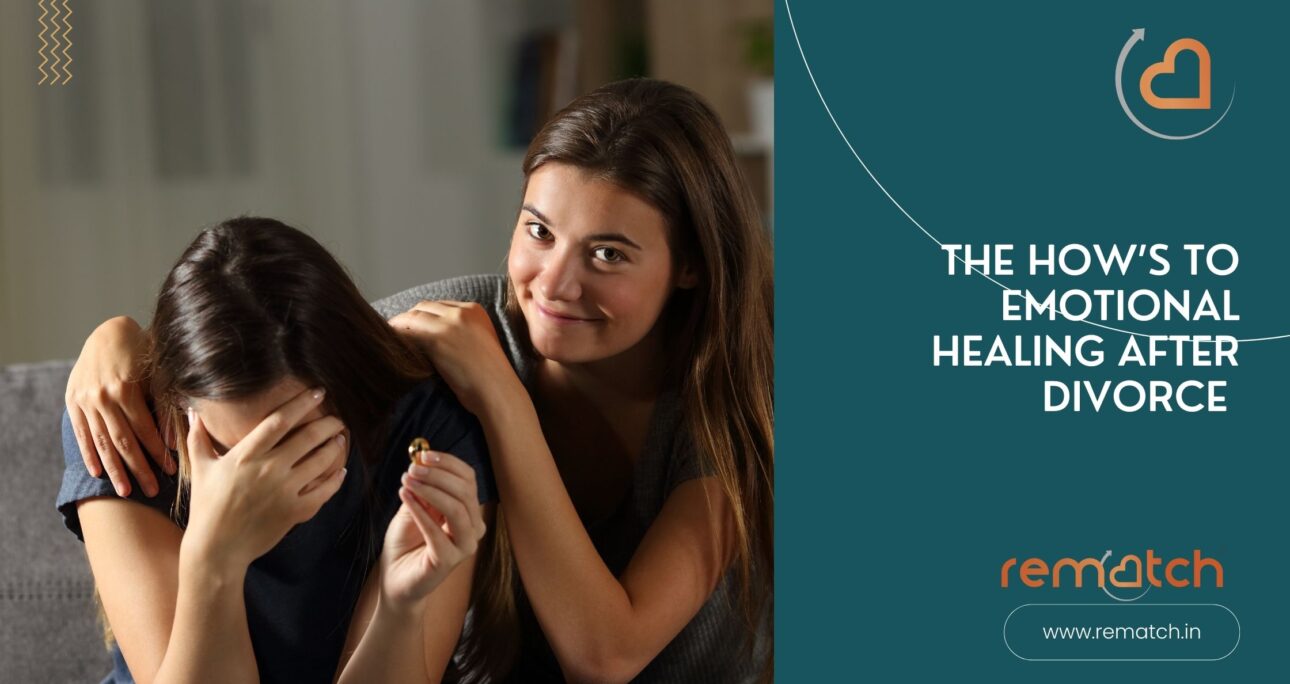Emotional Healing After Divorce: Divorce can be an emotional rollercoaster, leaving us feeling shattered and lost. But here’s the thing: healing is possible. It’s time to pick up the pieces and start a journey of emotional recovery after the breakup of your marriage.
Understanding the profound impact divorce has on our emotions is crucial. The feelings of grief, anger, and confusion are all part of this complex process. However, it’s essential to prioritize healing and moving forward. This is where a divorce coach can play a significant role in guiding you through the ups and downs of this transformative experience.
Recognizing the need for self-care and support is key during this challenging time. Taking care of yourself emotionally, physically, and mentally will aid in your healing process. With divorce being such a life-altering event, having someone by your side who understands both the divorce process and its emotional toll can make all the difference.
Grieving and Coping Strategies: Emotional Healing After Divorce
Going through the stages of grief after divorce can be a challenging process. It is important to recognize that grieving is a natural response to loss, and in this case, the loss of a marriage. Here are some strategies to help you cope with the emotional healing process:
- Acknowledge your emotions: Allow yourself to feel the pain and painful feelings associated with divorce. It’s normal to experience a range of emotions, such as sadness, anger, confusion, and even relief. Permit yourself to grieve.
- Find healthy ways to cope: Explore different ways to manage stress and negative feelings during this difficult time. Engaging in activities like exercise, meditation, or journaling can provide an outlet for your emotions. Surround yourself with supportive friends or join support groups where you can share your experiences.
- Embrace self-reflection: Take this opportunity for self-reflection and personal growth. Use this time to evaluate what went wrong in the relationship and identify any unhealthy habits or patterns that contributed to the divorce. Self-reflection can lead to valuable insights and help you make positive changes moving forward.
- Seek professional guidance when needed: If you find it challenging to navigate through the grieving process on your own, don’t hesitate to seek professional help. A therapist or counselor specializing in divorce recovery can provide guidance and support tailored specifically to your needs.
Remember that healing takes time, so be patient with yourself throughout this journey of emotional healing after divorce. By acknowledging your emotions, finding healthy coping mechanisms, embracing self-reflection, and seeking professional guidance when necessary, you can gradually move towards a brighter future filled with hope and happiness.

Building a Supportive Network:
Going through a divorce can be emotionally challenging, but building a supportive network can help you navigate the healing process. Surrounding yourself with understanding friends and family is crucial during this time. They can provide a listening ear, offer advice, and be there for you when you need someone to lean on.
In addition to relying on your existing support system, joining support groups or online communities specifically designed for divorced individuals can be immensely helpful. These groups provide a safe space where you can connect with others who are going through similar experiences. Sharing your thoughts and feelings with people who understand firsthand what you’re going through can bring solace and reassurance.
Cultivating new friendships and connections post-divorce is another important aspect of building a supportive network. While it may feel daunting at first, reaching out to new friends or reconnecting with mutual friends can introduce fresh perspectives into your life. Exploring common interests together can foster meaningful connections that contribute to your emotional healing journey.
Creating a safe space to express emotions without judgment is vital for emotional healing after divorce. Whether it’s confiding in trusted friends or seeking professional help from therapists or counselors, having an outlet where you feel comfortable sharing your vulnerabilities is essential. This allows you to process your emotions openly and work towards finding inner peace.
By actively working on building a strong support system, you’ll discover the strength within yourself to heal emotionally after divorce. Remember that many people have gone through similar challenges and have come out stronger on the other side. With the right network of friends, family, and professionals by your side, you’ll find the ability to heal and move forward in life.
Read: How to find love again in life?
Self-Help Tips for Healing and Rebuilding
Practicing self-love, forgiveness, and acceptance:
- Embrace self-love as a crucial part of the healing process after divorce.
- Forgive yourself for any mistakes or shortcomings during the relationship.
- Accept that the past cannot be changed and work on how to move on in life.
Engaging in activities that bring joy and promote healing:
- Find activities that bring you joy and make you feel alive.
- Surround yourself with positive people who support your healing journey.
- Explore new hobbies or revisit old ones to rediscover your passions.
Setting realistic goals for personal growth post-divorce:
- Start by identifying areas of your life that need improvement or healing.
- Set small, achievable goals to rebuild your confidence and sense of self gradually.
- Celebrate every milestone along the way to keep yourself motivated.
Focusing on building a positive mindset for the future:
- Challenge negative thoughts and replace them with positive affirmations.
- Practice gratitude by making a daily list of things you are thankful for.
- Visualize a bright future filled with happiness, love, and personal fulfillment.
By following these self-help tips, you can embark on a healing journey after divorce in a healthy way. Remember to prioritize self-care, seek professional advice if needed, and give yourself time to heal from emotional wounds. Your home should be a sanctuary where you can find solace rather than turning to alcohol or unhealthy coping mechanisms. Take charge of your recovery by implementing these strategies and gradually rebuilding your life in a positive direction.
Seeking Professional Help for Emotional Recovery: Importance of Emotional Healing after Divorce
Considering therapy or counseling as an effective tool for healing can greatly aid in emotional healing after a divorce. It provides a safe space to process the emotional pain and negative emotions that often accompany this difficult time.
Exploring different therapeutic approaches tailored to your needs is crucial. Cognitive-behavioral therapy (CBT) can help you identify and change negative thought patterns, while mindfulness-based therapy promotes self-awareness and acceptance. These approaches offer practical strategies to manage anger, sadness, and other challenging emotions.

Utilizing resources provided by mental health professionals specializing in divorce recovery is essential. Family therapists and medical professionals who specialize in this area have the expertise to guide you through the healing process. They can provide valuable insight, support, and coping mechanisms specific to your situation.
Understanding how professional help can facilitate emotional growth is vital. Therapists can help you navigate the complexities of post-divorce life, offering guidance on rebuilding self-esteem, setting boundaries, and developing healthy coping mechanisms. Their expertise empowers you to heal and grow emotionally during this transformative period.
Conclusion
Emotional healing after divorce is a process that requires time, self-reflection, and support. It is important to acknowledge and grieve the loss, while also focusing on moving forward and rebuilding a fulfilling life.
Throughout this journey, it is crucial to employ coping strategies that work for you. This may involve seeking therapy, journaling, practicing mindfulness techniques, or engaging in physical activities that promote well-being. Remember that everyone’s healing process is unique, so find what works best for you.
Building a supportive network of friends and family can provide the necessary emotional support during this challenging time. Surround yourself with positive influences who understand your situation and can offer guidance and encouragement along the way.
Self-help tips such as setting boundaries, practicing self-care routines, and exploring new hobbies, can aid in healing and rebuilding your life after divorce. Taking care of yourself physically, mentally, and emotionally will contribute to your overall well-being.
If you find that your emotional recovery requires additional assistance or guidance beyond what you can achieve independently or through your support network, do not hesitate to seek professional help. Therapists or counselors specializing in divorce recovery can provide valuable tools and insights to facilitate your healing journey.
Remember that emotional healing after divorce is a personal endeavor but one that does not have to be faced alone. Reach out for support when needed and embrace the growth opportunities this experience presents. You have the strength within you to heal and rebuild a fulfilling life post-divorce.
FAQs
Q: How long does it typically take to heal emotionally after a divorce?
A: The duration of emotional healing varies from person to person. It depends on various factors, such as the length of the marriage, individual resilience levels, external support systems available, etc. Healing takes time; be patient with yourself throughout the process.
Q: Can I heal emotionally without seeking professional help?
A: While professional help can greatly assist in the healing process, it is not a prerequisite. Many individuals find solace and healing through self-reflection, support from loved ones, and engaging in self-help techniques. However, if you feel overwhelmed or stuck, seeking professional help can provide valuable guidance.
Q: What are some self-care practices that aid emotional healing after divorce?
A: Engaging in activities that bring you joy, prioritizing rest, practicing mindfulness or meditation, exercising regularly, and maintaining a healthy lifestyle are all beneficial self-care practices for emotional healing.
Q: Is it normal to experience setbacks during the healing process?
A: Yes, setbacks are a common part of the healing journey. Healing is not linear; there may be moments when old emotions resurface or new challenges arise. It is important to be patient with yourself and seek support during these times.
Q: How can I rebuild my life after divorce?
A: Rebuilding your life after divorce involves setting new goals, exploring new interests or hobbies, focusing on personal growth, establishing a support system, and embracing new opportunities. Take it one step at a time and be open to positive changes in your life.


